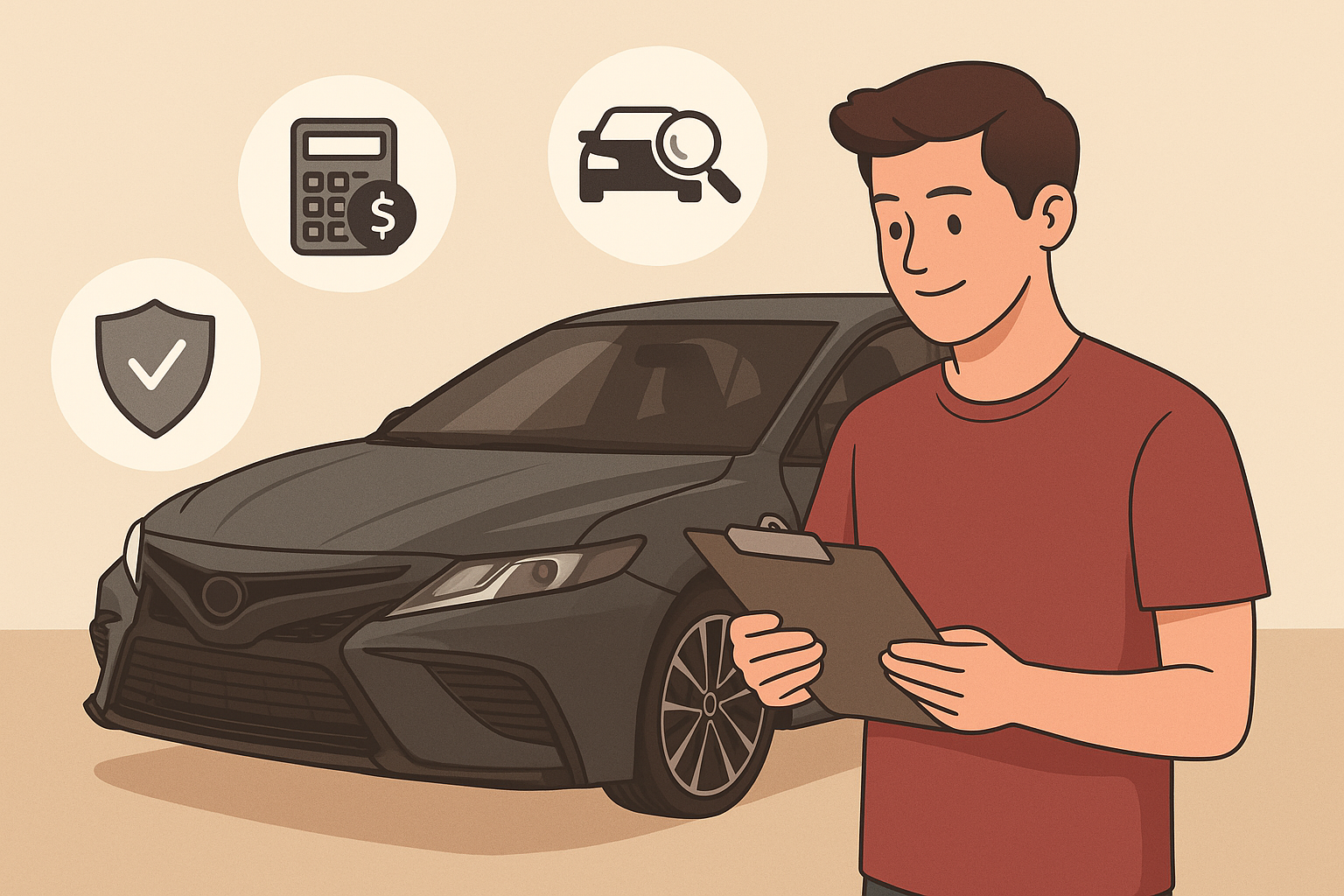Buying your first car can be an exciting milestone—but without proper guidance, it’s easy to make choices that cost you more in the long run. Between financing traps, insurance confusion, and unclear vehicle history, first-time car buyers often fall into avoidable mistakes.
This guide will walk you through the most important steps of the car buying process in 2024 and help you avoid common missteps that could leave your budget (and your peace of mind) in trouble.
1. Not Setting a Realistic Budget
The first and biggest mistake new buyers make is shopping before budgeting. It’s not just the car’s sticker price—you need to factor in:
Taxes and registration fees
Insurance premiums (higher for new drivers)
Fuel and maintenance costs
Loan interest if financing
Tip: Use the 20/4/10 rule—put down at least 20%, finance for no more than 4 years, and keep total monthly vehicle costs under 10% of your income.
2. Ignoring Pre-Approval for Financing
Dealerships often offer financing, but it may not be the best rate available. Always compare offers by getting pre-approved from a credit union, bank, or online lender before stepping into a showroom. It gives you leverage and protects you from being upsold on costly add-ons.
Tip: Look beyond the monthly payment. Focus on total loan amount and interest rate (APR).
3. Failing to Research the Right Car
Buying what’s trending—or what a friend suggests—without checking whether it fits your lifestyle, budget, or driving needs can lead to regrets. You might fall for looks instead of practicality.
Ask yourself:
Will I drive mostly in the city or on highways?
Do I need lots of cargo space or fuel efficiency?
Is this car expensive to repair or insure?
Tip: Use resources like Kelley Blue Book, Edmunds, and IIHS to compare reliability, safety, and total cost of ownership.
4. Skipping the Vehicle History Report (for Used Cars)
If you’re buying a used car, never rely solely on a dealer’s word. Always get a vehicle history report through Carfax or AutoCheck. It tells you about accidents, title issues, odometer rollbacks, and maintenance history.
Red flags include:
Salvage or flood title
Frequent ownership changes
Gaps in maintenance records
5. Not Test Driving Enough Cars
A test drive is essential—and not just a 5-minute loop around the block. Many buyers forget to test how the car handles in traffic, on highways, or how easy it is to park and navigate.
When test driving:
Check visibility, brakes, and blind spots
Try out tech features and infotainment
See how comfortable it feels after 15+ minutes
Tip: Drive at least 3 similar vehicles to compare handling, noise, space, and comfort.
6. Forgetting to Check Insurance Costs
Insurance premiums can vary wildly based on the model, your age, and driving history. First-time buyers are often surprised when a seemingly affordable car comes with high monthly insurance costs.
Tip: Get quotes before buying. Compare full coverage vs. liability, and ask about discounts for safety features or telematics programs.
7. Not Understanding Certified Pre-Owned (CPO) vs. Used
Certified Pre-Owned vehicles are typically newer, low-mileage used cars that come with warranties and have passed manufacturer-backed inspections. They cost more than regular used cars but offer peace of mind.
If you’re unsure about buying used, CPO might be the better route.
8. Overlooking Ownership Costs
Buying the car is just step one. You’ll need to budget for:
Routine maintenance (oil, brakes, tires)
Unexpected repairs
Registration renewals
Inspection fees (in some states)
Tip: Look up the car’s 5-year ownership cost before committing. Some vehicles are cheap upfront but expensive to keep on the road.
9. Rushing the Deal
High-pressure sales tactics are common—especially at the end of the month. Don’t let anyone rush you into signing paperwork before you’re ready. Take your time, review the financing terms, and don’t be afraid to walk away.
Tip: Always ask for the out-the-door price. It includes all fees, taxes, and extras.
10. Skipping a Mechanic Inspection (Used Cars)
Even if a used car looks perfect, always get a pre-purchase inspection from an independent mechanic. It typically costs $100–$150 but can save you thousands if they uncover engine or frame issues.
Bonus Tip: Consider Electric or Hybrid Options
With rising gas prices and growing incentives, many first-time buyers are looking into hybrids or EVs. These cars may cost more upfront but save significantly over time in fuel and maintenance.
Incentives to check:
Federal tax credit (up to $7,500)
State-level EV rebates
Insurance discounts for green vehicles
Final Thoughts: Take the Emotion Out, Bring the Research In
It’s easy to fall in love with a car, especially your first. But smart buyers focus on total value, fit, and long-term costs, not just aesthetics or hype. Use every resource available, ask lots of questions, and don’t rush.
You’ll drive off the lot not just with a new car, but with confidence that you made a smart investment.
